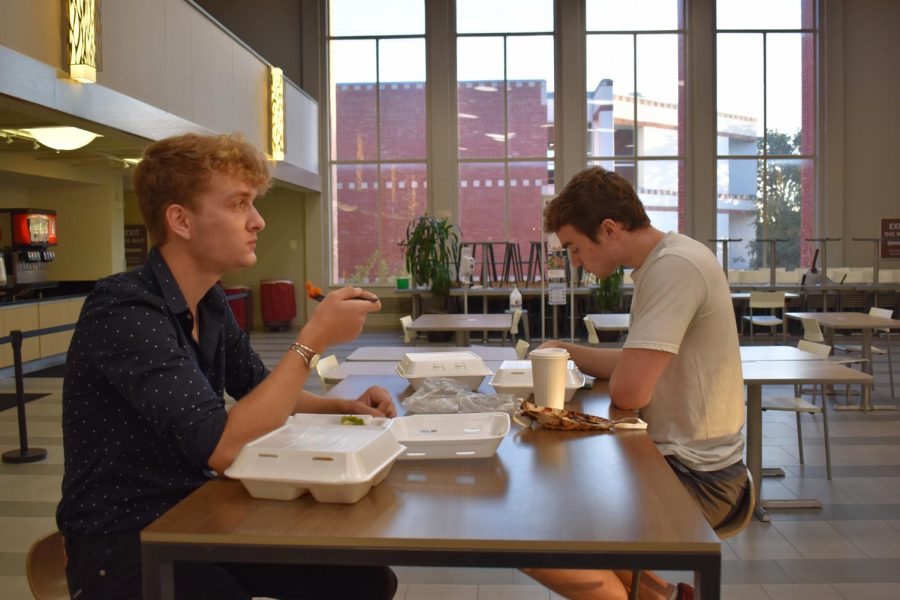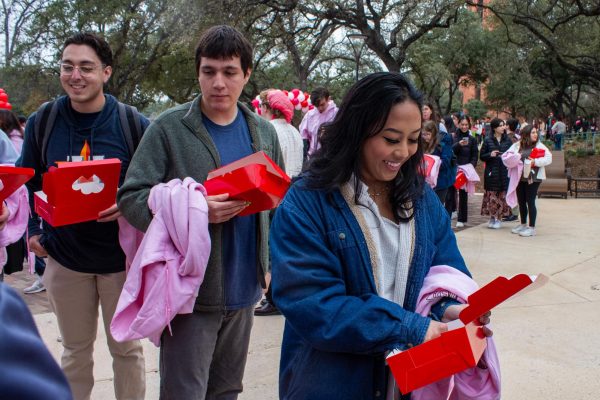Tigers Against Aramark continue push for contract repeal
Student-led group continues to push for alternative dining
First-years John Hawes and Sean Mitchell eating dinner at Mabee Dining hall, an Aramark dining service.
Earlier this October, the student group Tigers Against Aramark (TAA) publicized the demand that Trinity break its contract with the food provider Aramark. After releasing a shared statement and sharing petitions with community members and “student”students organizations, the group began pushing Trinity administrators towards ethical dining solutions at Trinity.
TAA’s goal of Trinity breaking its dining services contract with Aramark is based on allegations of the company’s unethical involvement in the prison-industrial complex. The movement of students challenging their university to break ties with Aramark is not unique to Trinity; the group cites efforts at other universities as models for their own goals.
At the Oct. 14 Student Government Association (SGA) meeting, TAA discussed their goals with the student body and Trinity administrators and posed questions and concerns to two regional Aramark representatives in attendance. Two weeks ago, members of TAA sat down with Trinity administrators to discuss the logistics behind breaking the contract with Aramark.
“This meeting was really to continue that conversation, get on the same page with them, to sort of lay out some goals for what we’re expecting and how we hope the administration will listen to our concerns and make a plan for moving forward,” said Carson Bolding, senior economics and communication double-major and TAA member.
Many of the logistics that were discussed centered around the financial situation. While the contract is supposed to end in 2023, breaking it off early could result in financial loss for Trinity due to the nature of the contract.
“I think that, given Trinity’s financial circumstances during the COVID-19 pandemic, we don’t want to make any abrupt losses that could delay any of the construction projects or anything that may contribute to students’ wellbeing because, of course, there are trade-offs to be made that we are well aware of now,” said Brandon Niday, sophomore political science and economics major and TAA member.
Despite this difficulty, TAA continues to push for a resolution to their cause.
“Our ultimate concern is making sure that Trinity isn’t contracting with an organization that is complicit to the prison-industrial complex,” Bolding said. “You have to be able to balance the financials with the ethics, and I believe the ethics should outweigh the financials.”
In consideration of possible dining service alternatives, Bolding spoke about the prospect of a self-service dining option.
“We think that there is a lot of potential there in creating a really ethical environmentally sustainable and also economically viable food service option that also benefits the local community,” Bolding said.
David Tuttle, dean of students, acknowledged that there were “advantages and disadvantages” to the proposal and that, although he recognizes the students are interested in exploring it, they need more information.
Another option suggested by Judith Norman, philosophy professor and supporter of TAA, was a cafeteria-based dining experience.
“If you have a local company or even Trinity employees providing the food with a food line where you don’t have as many options, it’s a win for social justice and a win for environmental justice, but you have fewer options. What I’d love is more of a critical consciousness where students are more aware that doing the right thing means not always having at your disposal the options that you had previously,” said Norman. “But I do trust the process that the students have set up to have their voice resonate in whatever deliberations the university makes.”
Tuttle shared that he felt optimistic about the conclusion of the meeting between TAA members and administrators.
“I conferred with the other admin after the meeting, and we were very impressed at the students who did come from TAA and their willingness to collaborate, and just how professional they were,” said Tuttle.
Students also came away from the meeting with a positive outlook.
“I think it was really productive. The administration was really willing to listen to our concerns,” Bolding said.
Although no definitive calls have been made about the contract with Aramark, Niday pointed out that it’s still early in the process.
“I think that since we’re valuing the students’ interests, they can expect some results that will positively impact their experience on campus. It might not be as soon as we’d like, but that’s just the nature of student activists,” Niday said.
While their name indicates a focus on Aramark, the group looks to continue their efforts beyond Aramark.
“We also want Trinity to look at other vendor relationships and to consider all of our contracts and relationships and how they are impacting the broader community,” Bolding said.
TAA plans to host a panel next semester in which they consult local food justice leaders in San Antonio like Rebel Mariposa, the owner of local restaurant-bar La Botanica.
“We have to change the way we do business in our country, and it begins with our own small businesses, and it begins in our universities,” said Mariposa. “Oftentimes, this is where people are radicalized for the first time or understand more of social justice issues. I think that it’s important that it starts at a place like Trinity where we talk about Aramark.”
Additionally, Norman commented about the students’ grasp on social justice.
“Whether or not Trinity breaks off the contract, the publicity that the students are bringing to this issue, to the question of conditions in prison, to the status of private vendors on campus like Aramark, is invaluable.”

My name is Claire Sammons and I am an Anthropology and Communications double major. I have worked for the Trinitonian since fall of 2020. I became a photographer...










